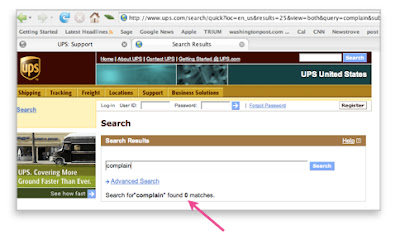Fed Up with UPS
 Thursday, August 30, 2007 at 7:19PM
Thursday, August 30, 2007 at 7:19PM Every once in a while, for some bizarre reason, Amazon ships me a book UPS ground with the requirement that I sign for the package. Why only occasionally? Weird. Not that it's a big deal, since I keep a fully quipped out office in my home, so I can usually hang out and wait.
Now we get to my complaint. The UPS delivery guy has been claiming that he's tried to deliver the package but that I've not been home. Not true. Is he lying? Here are the possibilities:
1. The call box on our condo building failed.
2. The call box on our condo building worked, but I didn't hear the phone call.
In the first possibility, you'd think that the driver would leave a note to that effect. No. In fact, in all the three delivery attempts on record, he only left ONE note, on the SECOND attempt. After the third attempt, I got a postcard saying they were about to send the package back, and I should call, or come by to pick it up. I called and arranged for another delivery today. I left my home number (in case possibility 1 was in play), my cell phone number (as a backup), and I even left a note downstairs that the UPS guy should HONK HIS HORN if neither of those were viable.
After waiting all day, I finally checked package delivery status online. The UPS record claimed the guy had come by at roughly 2pm and that I was not there to receive the package. Not true.
So maybe possibility 2 is in play?
No such luck for UPS: my caller ID on my phone shows no attempt was made to call our unit. My wife just tested the call box. Works fine.
So, I called. I complained. A long CRM software nightmare story should be written. But for now, I just want to let you know that you CANNOT COMPLAIN TO UPS ON THEIR SITE.
If you search the site for the word "complain" in fact, you get zero results.
Hmmm.
What are the business lessons here?
I'll post my thoughts on that later. In the meantime, I need some serious yoga, or meds, or liquor, or all three. Yeesh.
UPDATE
September 27, London, UK
A colleague of mine, Scott Seiden of Customer Centric Strategies, just mentioned that Sirius, the satellite music service, just discontinued his favorite jazz station without notice. He called to complain -- and the customer service rep couldn't accept the complaint. There was nothing in the CSR system to capture that. So Scott went to the Sirius site -- no go. They don't have a place on the site to accept complaints.
So how can Sirius figure out why they have customer churn? Don't they realize that churn destroys profitability? Perhaps this institutionalized deafness to the customer explains their stock performance relative to the S&P 500. Wanna see?
Hmmm. It may be time to do a study on online complaint best practices. Anyone have such data?





Reader Comments (2)
I dislike them a lot (I'm trying to not say hate)! I just had an incident happen to me this morning that has made me vow never to deal with them again and especially at their customer center. A woman who works there was very rude to me today and I felt like there was no recourse to make my feelings known as to how I felt and get any results because of it. I talked to her manager and he defended her! I called the UPS number on the infonotice they sent to report it and I really don't think they care either! I'm about to use Google to find an executive number and complain that way. With the world as competitive as it is now how can they get off with treating their customers like crap!?!?!?
Jamesia,
I think you asked the question "How can they get off with treating their customers like crap?" rhetorically, as if there was no real reason. I expect you're trying to put them into the "These are Bad Guys" bin.
Here's what I think. With any competitive industry such as shipping (or airlines, see this http://current.newsweek.com/budgettravel/2007/09/readers_name_the_airlines_they.html?wpisrc=newsletter" REL="nofollow">link about pissed off airline customers), they expect a certain level of unhappy customers. I'll bet FedEx loses customers every day who switch over to UPS. And vice versa.
So there's an industry agreement no to spend too much money making people like us happy. If they lose us (so the thinking goes), it's a smaller financial loss than what it would cost to make us happy.
Here's the problem with that thinking:
1. It makes companies lazy. Instead of engineering for quality, bringing in customers' voices to reduce rage, and competing on reputation, they slum around with their competitors.
2. It makes companies vulnerable to competitors and new entrants. You think Blockbuster cared much if its front line people were rude before Netflix? Not.
3. It's a branding thing. With UPS you've got two signals to people like you and me that are being broadcast through experiences like ours. First, they don't care (as evidenced by the fact you cannot complain on their site). Second, one hand doesn't care what the other does (as evidenced by the fact that the incoming call center passes off complaints to local delivery warehouses, but there's no closed loop that lets me know that the problem was "heard" at the central office.
4. Angry customers are noisier than happy ones. Fred Reichheld in The Loyalty Effect has stats that must for sure understate this reality: happy customers talk up a company to 9 other people; unhappy customers complain about a company to 14 other people. The reason I think these stats must be understated: Looks at what Jamesia and I have just done. We've complained about UPS, with emotion and reason, to hundreds of people.
Welcome to the world of business 2.0, UPS. It's about the customer experience.
Thanks, Jamesia, for your comments!